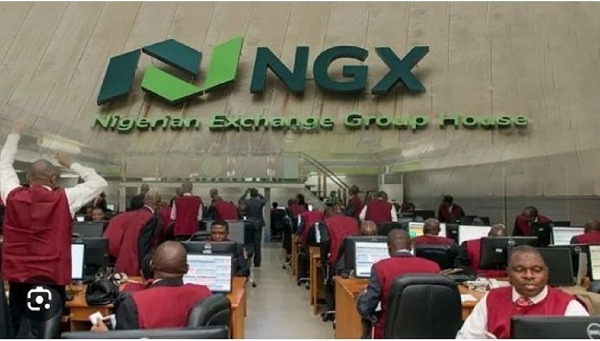The equities market responded sharply to uncertainties surrounding capital gains tax last week, leading to a single-day crash of 5.01 per cent in the All-Share Index of the Nigerian Exchange Limited on Tuesday.
Other factors cited as critical in the market included the US military threat looming over Nigeria, year-end portfolio rebalancing, and expectations of window-dressing by institutional players.
Analysts maintained that the meltdown was triggered by concentrated institutional selling and large block trades rather than broad-based market participation, indicating that investors exited their positions.
However, the trading pattern shifted into the green zone by midweek, and the market managed to claw back some of the earlier losses. This effectively moderated the weekly loss for the market capitalisation to N1.50 tn (or 1.58 per cent) and a 1.68 per cent decline for the ASI.
Key blue-chip stocks led the downturn, with Dangote Cement, BUA Cement, Aradel, Transcorp Power, Stanbic IBTC, and MTN Nigeria weighing heavily on overall performance. Meanwhile, offshore participants maintained strong interest in banking tickers such as Stanbic IBTC, Guaranty Trust Holding Company, Access Holdings, Zenith Bank, and Fidelity Bank, according to AIICO Capital. As a result, the ASI’s year-to-date return dropped to 42.8 per cent as of Friday.
A major boost for the market during the week was the assurance from the Minister of Finance and Coordinating Minister of the Economy, Wale Edun, at the NGX Closing Gong Ceremony to commemorate the listing of the Ministry of Finance Incorporated Real Estate Investment Fund Series 2 on the exchange. He said that the federal government would take a balanced approach to the capital gains tax issue.
Edun, who admitted seeing a lot of red on stockbrokers’ computers, said: “We have heard what you have said on capital gains tax. We are looking at it, and we will consult on what will give Nigeria an optimal result.
We will listen, analyse, discuss, and, at the end, decide, hopefully, what is best for Nigeria and Nigerians.”
The Chairman of the Presidential Fiscal Policy & Tax Reforms Committee, Taiwo Oyedele, in a post on his X handle, highlighted the changes that the new capital gains tax would bring and concluded: “The new CGT framework makes the tax system fairer, more aligned with global practice, and friendlier to long-term investors. It reduces investment risks, protects small investors, encourages reinvestment, and simplifies compliance while ensuring that large and high-income investors who wish to exit the market contribute their fair share on realised gains that are not reinvested.”
According to Oyedele, key changes under the CGT include progressive income tax rates ranging from zero per cent to 30 per cent, depending on the investor’s overall income or profit level. The top rate of 30 per cent, which applies to large corporate investors, is expected to be reduced to 25 per cent under broader corporate tax reform. Investors may now deduct certain costs previously disallowed under the old CGT regime, ensuring they are not taxed on a net loss position.
Transactions exempted under the new CGT framework include disposals within 12 months where total sales proceeds do not exceed N150m and total gains do not exceed N10m. Reinvestment of proceeds into shares of Nigerian companies within 12 months qualifies for a full exemption where the general exemption threshold is exceeded. Capital gains from foreign share disposals repatriated into Nigeria through CBN-authorised channels are also exempt.
Institutional investors enjoying corporate income tax exemption, such as PFAs, REITs, and NGOs, are exempted from CGT. Small companies with turnover not exceeding N100 m and total fixed assets of not more than N250 m pay 0 per cent CGT. Gains from investment in a labelled startup by venture capitalists, private equity funds, accelerators, or incubators are also exempt.
Oyedele clarified that corporate reorganisations such as mergers, acquisitions, or internal restructurings under the Nigeria Tax Act 2025 are exempt from CGT. Gains earned on shares up to 31 December 2025 will be grandfathered and only taxed upon disposal, where applicable. Investors are expected to maintain documentation of acquisition costs, sales proceeds, and related expenses for audit and verification.
Meanwhile, on the NGX, total turnover stood at 7.325 billion units of shares worth N156.43 bn exchanged in 134,383 deals, higher than the 3.575 billion units valued at N107.01 bn that exchanged hands in the previous week in 146,429 deals. Trading in the top three equities, Cornerstone Insurance Plc, Access Holdings Plc, and Zenith Bank Plc (by volume), accounted for 4.752 billion shares worth N41.132 bn in 14,304 deals, contributing 64.87 per cent and 26.29 per cent to the total equity turnover volume and value, respectively.
Sector performance was relatively mixed but leaned positive, with three of the five major sectors advancing. The Banking, Insurance, and Consumer Goods indices gained 1.26 per cent, 2.42 per cent, and 0.46 per cent, respectively, while Industrial Goods and Oil & Gas declined by 6.97 per cent and 0.85 per cent, respectively.
On the outlook for the coming week, analysts at AIICO Capital said: “Amid the recent clarification on the revised CGT, cautious sentiment is expected to persist as investors continue to assess the potential implementation process and await further guidance from policymakers. However, risk-seeking investors may view the recent price declines as attractive entry opportunities.”
Meristem Research, in its Week-in-View report, projected that the rebound in the equities market is likely to continue. “The NGX-ASI has already recovered part of Tuesday’s losses as investors take positions in strong stocks at attractive prices. With clearer tax guidance now in place, sentiment should remain steadier in the near term.”
In the coming weeks, trading activities are expected to be impacted by the October 2025 inflation data as well as the November Monetary Policy Committee decision on the benchmark interest rate.


